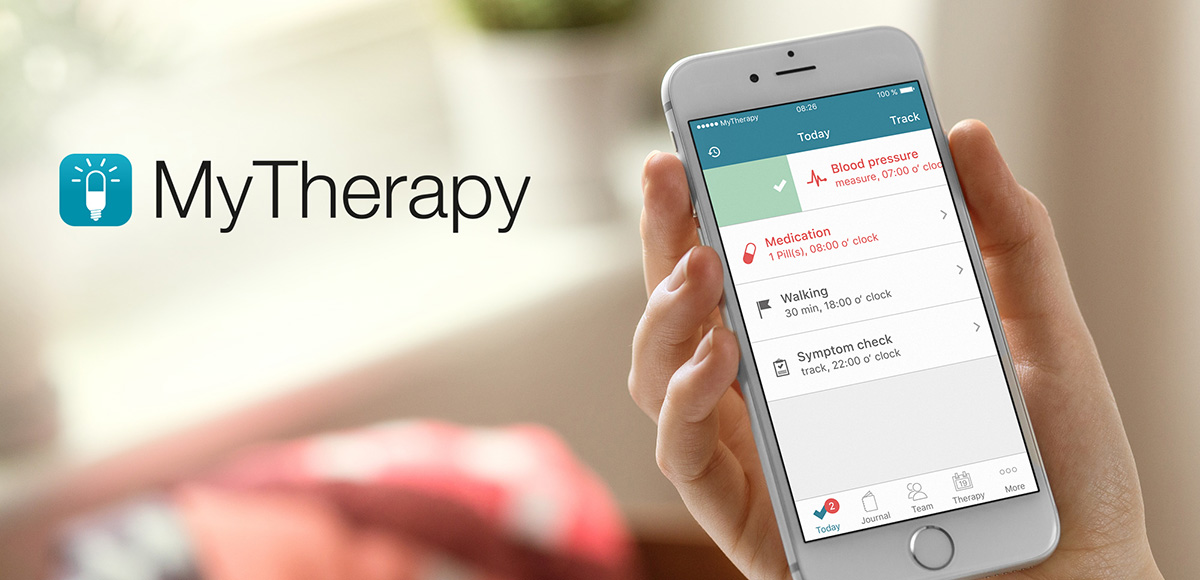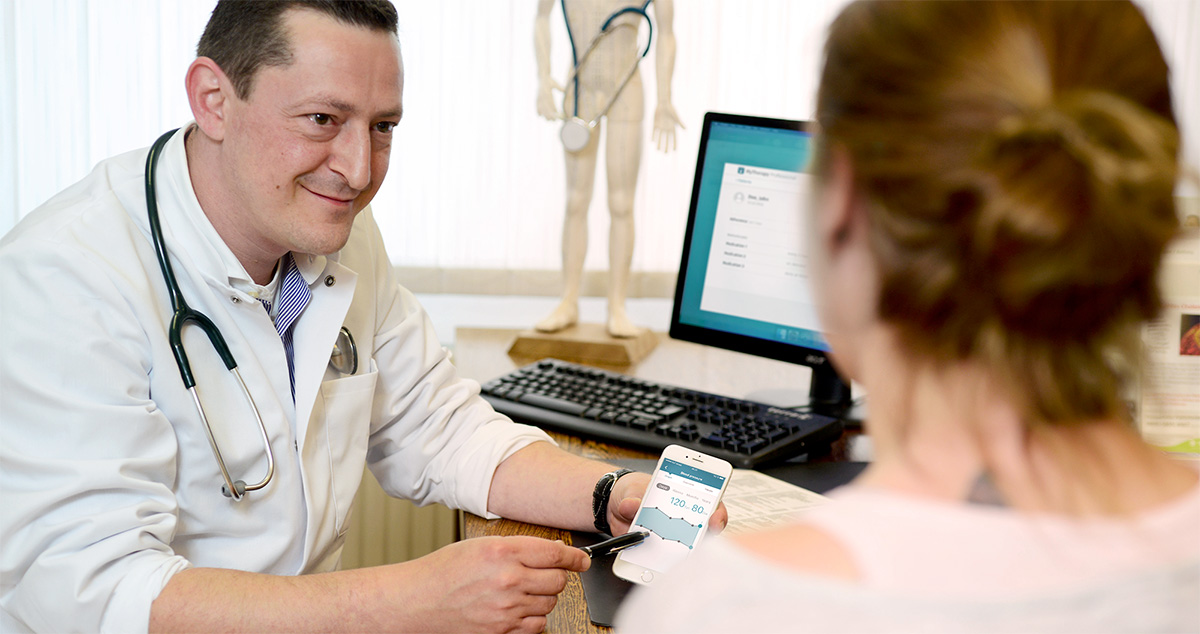Taking medications as prescribed is one of the most important aspects of successful therapy, yet many people still fail to do so.
Many patients forget to take their pills on time, thus putting their health - and in some cases, their life - in danger.
Due to the problem of medication non-adherence, the German-based company 'smartpatient' developed the MyTherapy app. The app functions as both a medication reminder and health tracker and includes a health journal, which allows users to monitor their symptoms, record important measurements, and set exercise goals.
The app is designed to help people, who take long-term medication, stay on top of their prescribed treatment plans.
We also had the opportunity to interview 'smartpatient' and ask them several questions about MyTherapy, as well as the company's future plans.
Can you tell us the story behind your mobile app? Where did the idea for your app come from? What served as your inspiration for the app?
In 2012, we were working on a project when we stumbled upon the problem of medication non-adherence. We were shocked when we found out that in Europe alone, almost 200,000 people die annually due to incorrect medication intake/ non-adherence. We then began to discuss this topic with our families and realized that the development of a medication reminder app was a chance to make a lasting difference not only in the lives of our families but also for millions of people. We were also fascinated by the fact that with medication reminder apps, healthcare systems can avoid unnecessary costs and save money. We established the company to make a lasting difference and help patients (especially those with chronic illnesses who require long-term treatment) get better, manage their conditions effectively and responsibly, and improve their overall health and well-being.

How did you build the content that's contained in the app? Does the information in your app come from evidence-based resources, such as scientific literature, peer-reviewed articles and case studies?
The first version of the app was developed in 2013 and since then, we have taken on more developers to help us improve the app and implement new features. For example, our app is available in over 25 languages and we consistently develop and tailor the app to the needs of patients via user feedback. Our user support team provides individual feedback to user reviews, comments, and suggestions. The app also evolved from being just a medication management app to include a digital health journal, which patients can use to track symptoms, medication side effects, and mood; and record important measurements. All the information logged in the app can be generated into a monthly health report that users can share with their healthcare professional.
We also strive to make the app as accessible as possible to as many people as possible. Therefore, MyTherapy also comes with accessibility features, such as Android’s TalkBalk feature and iOS’s Voiceover. We also ensure that our app is usable for people of all ages and we endeavor to keep the app as user-friendly as possible. And the good thing about MyTherapy is that it works for all medications and all illnesses. It does not matter if the user is taking medication for diabetes or has to document values because of asthma. We consistently make sure that MyTherapy can be used by everyone.
MyTherapy is absolutely evidence-based. To increase healthcare professionals’ adoption of the app, we invest heavily in studies, the results of which show the app improving medication adherence among other things. We currently have five partner universities, three published studies, and two studies in progress. Our app has also been tested by university hospitals, such as Charité Berlin and the University Hospital of Munich. The universities have found that our app does indeed improve medication adherence and subjective well-being. Furthermore, years of research involving patients and doctors means that our app is both patient- and doctor-centered and includes tailored solutions for our users.
What impact has your app had on clinical practice so far? We'd appreciate if you could share some stats on how frequently your app is used worldwide.
Around the world, patients use our app to take their medication safely and responsibly. We currently have more than one million users in 220 countries – a number that is continuously growing.
A recent study on medication adherence and MyTherapy was conducted on a group of patients (100 in total) with lipid metabolism disorders from the outpatient lipid department of the Charité – Universitätsmedizin Berlin. The results indicated once more that the app does indeed improve medication adherence, with the app significantly increasing the share of highly adherent patients. Participants also indicated that their physical activity improved due to the reminder function of the app and a large percentage of participants said that the app is user-friendly.
Previous studies on MyTherapy have investigated usability, acceptance, and app usage, also for older patients and older patients with type 2 diabetes. These studies demonstrated the app’s positive effects on medication adherence and health awareness.
An Interview with the Creators of the 'MyTherapy' Medication & Pill Reminder App
What are the tools and technologies used to build your mobile app (both cloud- and client-side)? Was it native or cross-platform development? Did you consider other technologies?
At 'smartpatient,' we understand that an outstanding UX needs the latest technology: our native apps use Swift and Kotlin and our websites use React.
When it comes to medical apps, sooner or later the issue of data protection and security always comes up. How do you make sure that user data is secure?
MyTherapy and 'smartpatient' adhere to strict German information protection and privacy laws (e.g. EU General Data Protection Regulation). We think that health data should stay private and different from other major players, we clearly state that we do not hand out user data to third parties. Users can find all they need to know about our terms of use and privacy policy on the app under the legal information section. Users also don’t have to register a user account to use our app and can, therefore, use MyTherapy without entering personal information. And on the technical side, we use the latest encryption standards for transferring and storing data.

What's next for your app? Are there any new features, functionalities, or upgrades planned for future updates?
We are consistently working on improving the app by keeping up with the last technological trends on both Android and iOS. The app is available in over 25 languages and we are going to be adding more in the near future, as we definitely want to internationalize our app further. We are also consistently working on updating and expanding our medication databases to other countries. We are always improving existing features and we are committed to designing new features that will help users get maximum benefit from their treatment plans. We aim to become the world’s leading medication and health tracker app and we want to keep the app free for our users while protecting their data and keeping the app free of ads and in-app purchases.
We are excited about the technologies and what they might hold for the healthcare and the future of medicine. What do you think this technology-driven, human-centered future holds for mobile health and how do your app plan to contribute?
Well, the Apple Health Records API was recently released as an extension to Apple’s HealthKit framework earlier in the year, and we believe this is a massive leap forward in connecting the world of healthcare IT with that of consumers.
Treatment management apps – such as MyTherapy – are perhaps the most obvious benefactors of Apple’s latest project. Another example might be tele-counseling and other forms of remote healthcare. Being able to share clinical-grade healthcare information directly could greatly enhance the service a healthcare professional is able to give. For the majority of people, this can greatly improve the functionality of their existing healthcare apps. Both new and existing apps will be able to work with a much more detailed layer of personalization with no extra effort on behalf of the user.
It gives people greater access to their healthcare information and encourages people to take a more active role in their care. This has been shown to improve patient-doctor communication while having a positive effect on aspects such as medication adherence.
More and more people are becoming interested in using apps/ digital health technology. The digital health market is expected to grow by 20% per annum through 2020. Technology designed to support chronically ill patients has just started to spread within the community.
MyTherapy attempts to differentiate itself from the other market products by incorporating a patient-centric approach. Our typical user has one or several chronic diseases. If a patient is living with diabetes and hypertension, for example, they would have to use several apps. From our point of view, patient centricity means having one app that adapts to the needs of the individual patient and their diseases. This is not only more convenient, it also makes more sense from a medical perspective.
MyTherapy is a good example of how people ultimately want to improve their health outcomes and well-being. To achieve this, they need to have more informed discussions with their healthcare providers and can use MyTherapy to keep track of everything health related. We see this as a larger trend: no matter if you look at digital health or other verticals like home automation, people want to make better, more informed decisions. Apps and devices can empower users, as long as privacy does not suffer.
Could you share some word of advice with other mobile app developers? What steps they should follow in order to make a successful app?
Focus on the patient experience!
- Photo courtesy of MyTherapy
- Photo courtesy of


Your thoughts on this